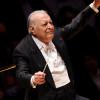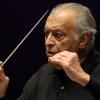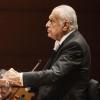At 89, conductor Zubin Mehta doesn’t make things easy for himself. Since taking on the role of the Los Angeles Philharmonic’s conductor emeritus, Mehta has been bringing Walt Disney Concert Hall audiences some of the largest-scaled late-Romantic works on earth.
He has done Gustav Mahler’s First, Second, and Third Symphonies, even lengthening the First by including the discarded “Blumine” movement; last December, he tackled Arnold Schoenberg’s gigantic Gurre-Lieder. In every case, he has delivered performances to remember. In his “Olympian” old age — a term once used for an esteemed predecessor at the LA Phil, Otto Klemperer — Mehta has often made lists of the leading conductors of our time.
However, Mehta is becoming increasingly frail due to old age. He emerged for his annual date on the Disney Hall stage Friday night (Nov. 7) in a wheelchair, gingerly making his way up the podium’s short flight of stairs. Earlier, he was forced to cancel a brace of concerts slated for this month and next with his former ensemble, the Israel Philharmonic, for “health reasons.” Yet he was determined to make this gig and present another sprawling late-Romantic monument: Anton Bruckner’s Symphony No. 8. And though it took some time Friday to cohere, Mehta once again delivered a performance to remember.
Bruckner’s Eighth is his longest symphony by default since he didn’t live long enough to finish the Ninth; the extant sketches for the latter’s Finale would have brought the Ninth’s length up to that of the Eighth, as conjectured “completions” have demonstrated. As things stand, the Eighth has the grandest span, departing from previous symphonies by switching the order of the scherzo and the slow movement to second and third, respectively. The scherzo and its Trio’s themes soar into higher spiritual territory, and the Adagio movement probes more deeply and more profoundly than its predecessors, pushing the boundaries in the direction of dissonance at times without quite crossing the line.
Mehta and Bruckner go way, way back to the conductor’s formative training in Vienna in the 1950s. One of his earliest recordings was of Bruckner’s Symphony No. 9 with the Vienna Philharmonic. He recorded the Eighth Symphony twice – the first time in an invigorating performance with the LA Phil in 1974 when he was its music director, and the second time with the Israel Philharmonic in 1992.
Mehta’s approach to Bruckner’s Eighth Symphony has changed since his 30s. His tempos have slowed considerably, except for the Adagio which remains about the same as before. The opening movement started strongly with a deep, rich texture from the cellos and contrabasses, though soon it became apparent that the strings were not at their cohesive best, and there were some wooly sounds coming from the horns on occasion.
The difference in tempos between 1974 and now was most noticeable in the Scherzo, which now moves like a steamroller instead of in a vigorous rush. The ensemble only coalesced after the first iteration of the theme and improved from there on.
Conducting the symphony from memory, Mehta’s gestures were minimal, far from the dynamic strokes of yore. Yet he kept things flowing and steadily created suspense in the Adagio, timing the buildup to the first climactic cymbal crash perfectly, eliciting forceful responses from the brass section. The discursive Finale fared best of all — balanced, unified, powerful in the pounding central climax with Joseph Pereira’s mallets swinging lustily on the timpani, and with plenty of culminating mystery on the road to the coda’s mighty finish.
When the performance ended, Mehta managed to walk (with some help) very slowly — yet purposefully — to the wings without the need of a wheelchair: triumphant, even defiant. His father, Mehli Mehta, who conducted into his 90s, once told me, “Mehtas never stop.” And so it is.




